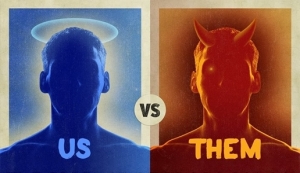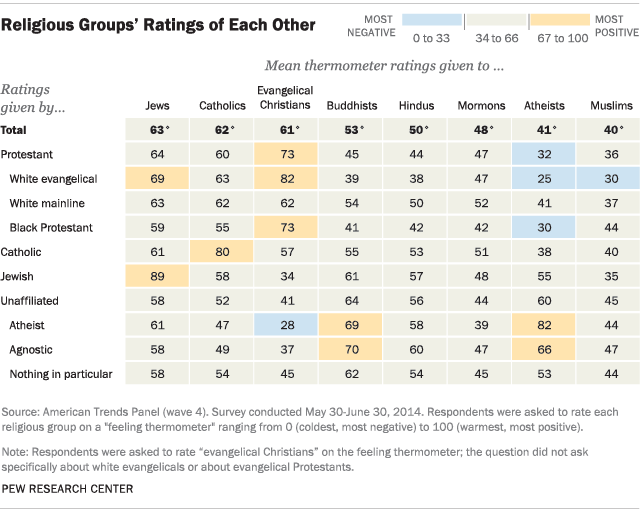 Our larger national culture is something that is actually composed of rather a lot of smaller micro-cultures and there are many different types of these micro-cultures within this larger national unit. As an example, this can manifest as distinct geographical variations (North vs South) where each is a distinctly different micro-culture even though in a larger more global context it can be viewed from the outside as one homogeneous culture.
Our larger national culture is something that is actually composed of rather a lot of smaller micro-cultures and there are many different types of these micro-cultures within this larger national unit. As an example, this can manifest as distinct geographical variations (North vs South) where each is a distinctly different micro-culture even though in a larger more global context it can be viewed from the outside as one homogeneous culture.
The above description actually works and can be applied to different nations – the North-South divide in the US, the UK, Italy, Ireland, etc… and so this is a common pattern that is not distinct to just one nation, but rather is quite global (I don’t of course mean specifically a North vs South divide, that specific incarnation of this is not global, but rather the geographical cultural diversity)
In general terms, the natural emergence of Micro-cultures like this tends to nurture an “us vs them” mode of thinking and so it can potentially dominate how we interact with any others that we perceive to be either part of or not part of any specific micro-culture that dominates our thinking.
Beyond geographical locations, another more interesting micro-cultural variation is religious belief (or lack of it). What make this specific micro-cultural variation different is that while other non-religious micro-cultures such as location might simply nurture a recognition that “they” are different, belief driven variations crank that up a notch or two to one where the view is that “they” are wrong / evil / stupid or some other similar negative variation. The strength of that feeling will also vary for different micro-cultures.
Side Note: Yes some of “them” may indeed be wrong, evil or stupid, but the truth is that you can’t generalise, because some within your micro-culture may also be wrong, evil or stupid. There are of course also specific popular ideas that really are wrong and can be demonstrated to be wrong, and yet thinking of those who embrace the idea as “them” will not help, but rather will encourage such individuals to cling to the idea more tightly, perhaps for the sole reason that it is a simply a requirement of group membership.
A tribal mentality can kick in and the “us vs ‘them'” mode of thinking can take root and deeply dominate those within a specific micro-culture, one that can colour (did my spelling just betray the national group that I am part of?) how we interact with others within the greater culture around us.
So what do we actually know?
Back in July PewResearch published the results of a poll that gives us an insight into how people within specific religious micro-cultures feel emotionally about individuals who inhabit distinctly different religious micro-cultures. Here is what they found (and some of this is really not a surprise) …
The non-surprising observations
- The religious really don’t like atheists
- The feelings of most regarding Muslims tends to lean towards the negative
- Atheists really really don’t like the evangelical Christians (I wonder why)
Some information that might not have been so obvious
- Both Atheists and Agnostics feel quite positive about Buddhists
- All are quite positive about those that are Jewish
- The folks who are nothing in particular lean towards being neutral for everybody
Now that last one is interesting, the “Nothing in particular” group, those who do not identify themselves as members of any of these religious micro-cultures and so don’t retain any “us vs them” thinking, also do not have any particularly strong feelings (positive or negative) towards anybody within any such sub-culture.
There are also a few other interesting discoveries as well
In the detail they break things down by age and that reveals something quite positive. Christian groups and Jews receive higher ratings from older Americans (those ages 65 and older) than from younger Americans. By contrast, other non-Christian groups receive their highest ratings from younger Americans. Adults under the age of 30, for instance, give Muslims a neutral rating of 49, on average, whereas older adults give Muslims significantly more negative ratings.
- Translation : the younger generation are a heck of a lot more tolerant.
- How do we explain this, is it just an age thing? I suspect not just age itself, but perhaps it is rooted in the observation that there are rather a lot of Christians in the older age range and not so many in the younger age range. This is not specific a negative observation regarding one specific micro-culture, but rather that if you are not rooted within one specific micro-culture, then it leads to you being more tolerant of diversity.
Is there More?
Oh yes, lots more, so I’m only pulling out a few items of interest and will not be tossing it all at you.
One other interesting observation I will bring here is one we are perhaps all familiar with. The political micro-culture you belong to appears to also greatly skew your feelings towards those in other religious micro-cultures. For example …
The Republicans tend to be a lot warmer towards Christians and a lot colder towards Atheists and Muslims. In contrast, the democrats tend not to have such strong positive or negative feelings and are a lot more tolerant towards everybody.
What is going on here?
Well, this is perhaps a reflection of the hijacking of the Republican party by the Evangelicals since the 1970s, it is this that in turn that has influenced their feelings towards others, and so I suspect it is not specifically a political thing, but rather is a symptom of a specific religious micro-culture embedding itself into this specific political micro-culture.
Personally Knowing “Them” really helps
What we also learn is that knowing someone from a religious group is linked with having relatively more positive views of that group.
- Those who say they know someone who is Jewish, for example, give Jews an average thermometer rating of 69, compared with a rating of 55 among those who say they do not know anyone who is Jewish.
- Atheists receive a neutral rating of 50, on average, from people who say they personally know an atheist, but they receive a cold rating of 29 from those who do not know an atheist.
- Similarly, Muslims get a neutral rating (49 on average) from those who know a Muslim, and a cooler rating (35) from those who do not know a Muslim.
So all in all, it is quite an interesting read and grants us insights into how the various religious micro-cultures feel about each other.
This last one appears to be the secret sauce that enables the barriers between us and “them” being broken down … for those that are religious – actually knowing an atheist and realising that they don’t have horns on their heads … or for those that are not religious – finding out that a friend who is smart and intelligent also happens to also be religious … all helps to demolish the myths, those artificial barriers, that exist between these micro-cultures.
We live in a world within which our ability to interact with those beyond our micro-culture has greatly increased – the inevitable outcome in the long term is that it will lead to a better world.
Finally the most obvious – we are all one species, the divisions we experience are indeed purely grounded in how we think – just imagine how different somewhere like Syria might be if the passionate embrace of specific religious ideas did not dominate the thinking.

